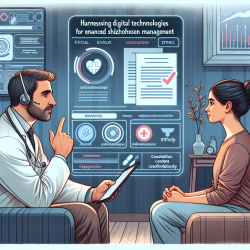Unlocking the Power of Mentorship in Residency Programs
Mentorship is a cornerstone of professional development, particularly in the demanding field of medicine. A recent study titled "Implementation and first experiences with a multimodal mentorship curriculum for medicine-paediatrics residents" provides valuable insights into how structured mentorship can significantly enhance residency programs. This blog delves into the findings of this research and offers practical guidance for practitioners looking to implement similar strategies in their own settings.
The Importance of Mentorship
Mentorship has been shown to increase trainee productivity, boost career satisfaction, and reduce burnout. The study conducted by Allan-Blitz et al. (2022) highlights the benefits of a well-structured mentorship curriculum. The research found that overall satisfaction with mentorship improved from 57.6% to 73.4% post-intervention, while satisfaction with emotional support increased from 63.1% to 71.6%. These findings underscore the importance of mentorship in fostering a supportive and productive learning environment.
Key Components of a Successful Mentorship Curriculum
The research outlines a comprehensive mentorship curriculum that includes:
- Peer Mentorship: Pairing residents with peers based on professional interests to facilitate knowledge exchange and emotional support.
- Virtual Check-Ins: Regular virtual meetings with residency leadership to address individual mentorship needs.
- Focused Didactics and Workshops: Sessions covering core topics such as career planning, leadership, and clinical efficiency.
- Small-Group Dinners: Opportunities for residents to explore different career paths through informal gatherings.
- Faculty Bridges: Dedicated faculty members who connect residents with mentors outside the program.
Implementing a Mentorship Curriculum: Practical Steps
For practitioners looking to enhance their mentorship offerings, consider the following steps:
- Assess Current Needs: Use surveys to gauge resident satisfaction and identify areas for improvement.
- Develop a Structured Curriculum: Incorporate diverse mentorship models, including peer and faculty mentorship.
- Leverage Technology: Utilize virtual platforms to maintain connectivity and support during challenging times, such as the COVID-19 pandemic.
- Encourage Feedback: Regularly solicit feedback from participants to refine and improve the curriculum.
Looking Ahead: Future Directions
The study suggests that while the implemented mentorship curriculum showed promising results, further research is needed to assess its impact using more objective outcome markers. Expanding the program to include a larger and more diverse group of residents could provide additional insights into its effectiveness.
To read the original research paper, please follow this link: Implementation and first experiences with a multimodal mentorship curriculum for medicine-paediatrics residents.










